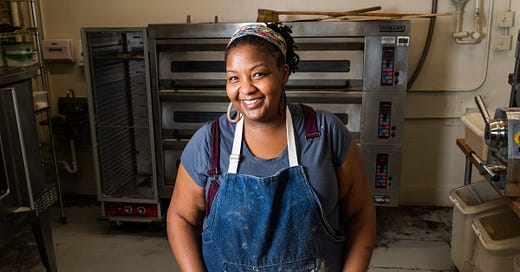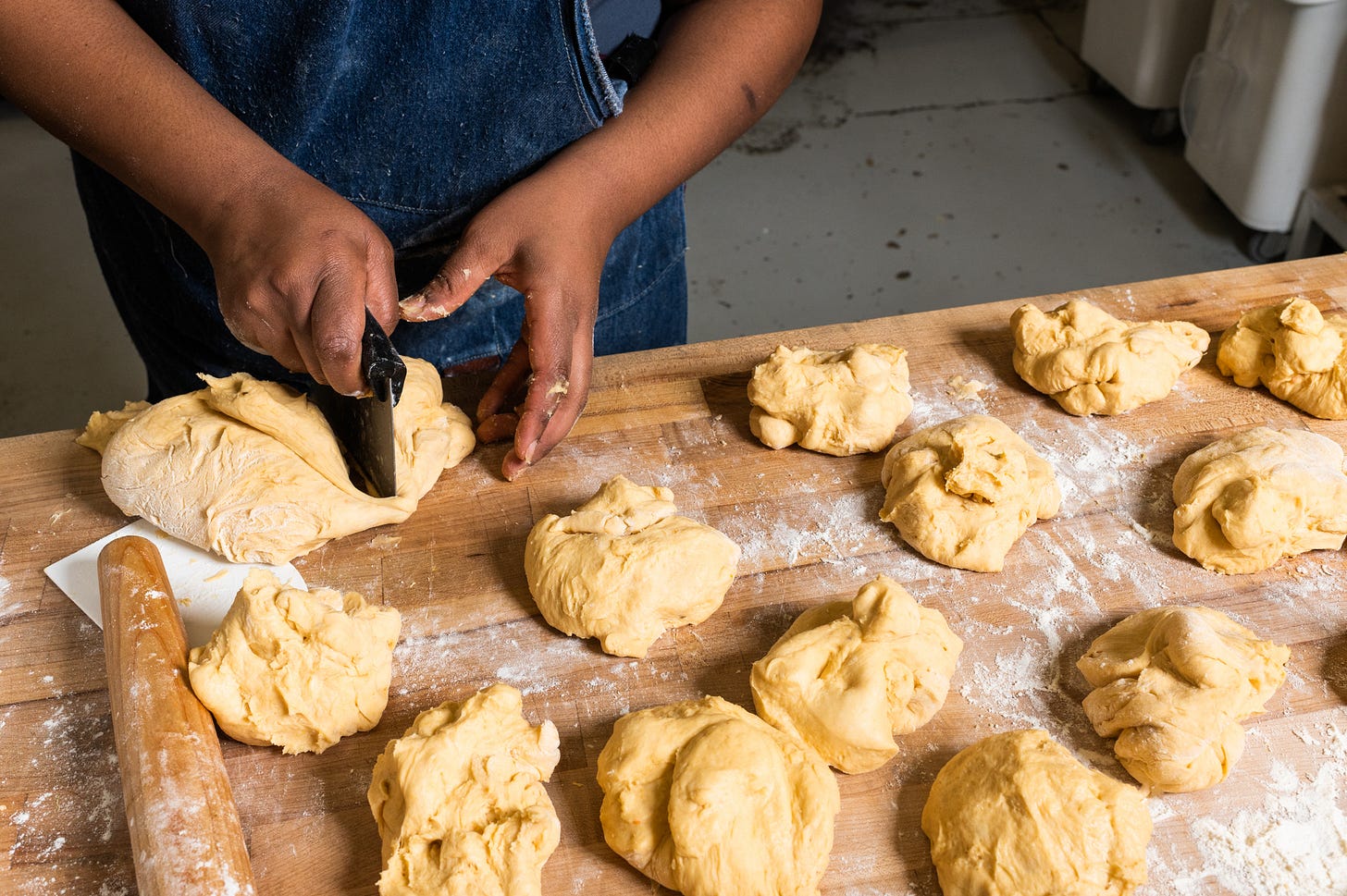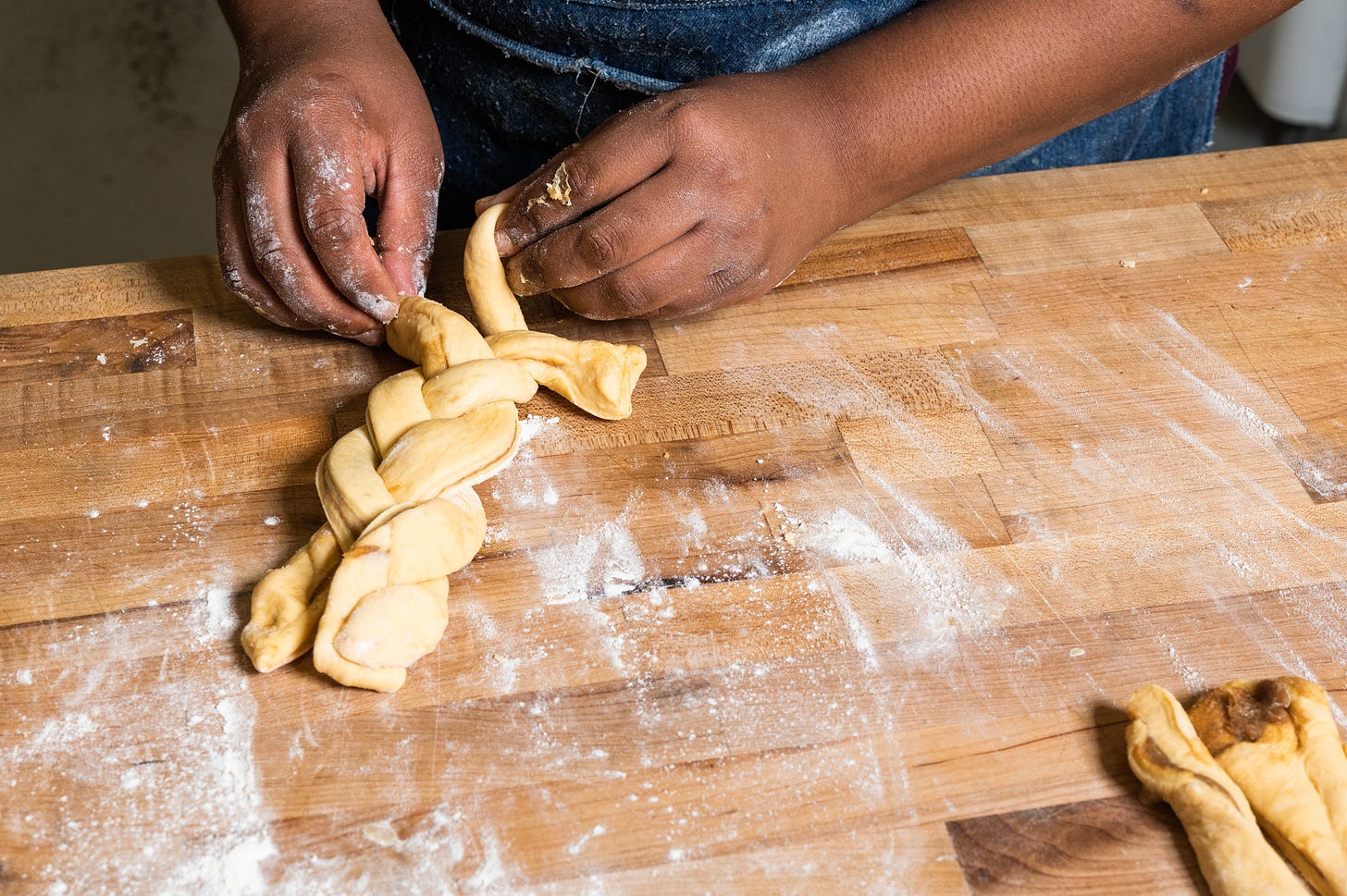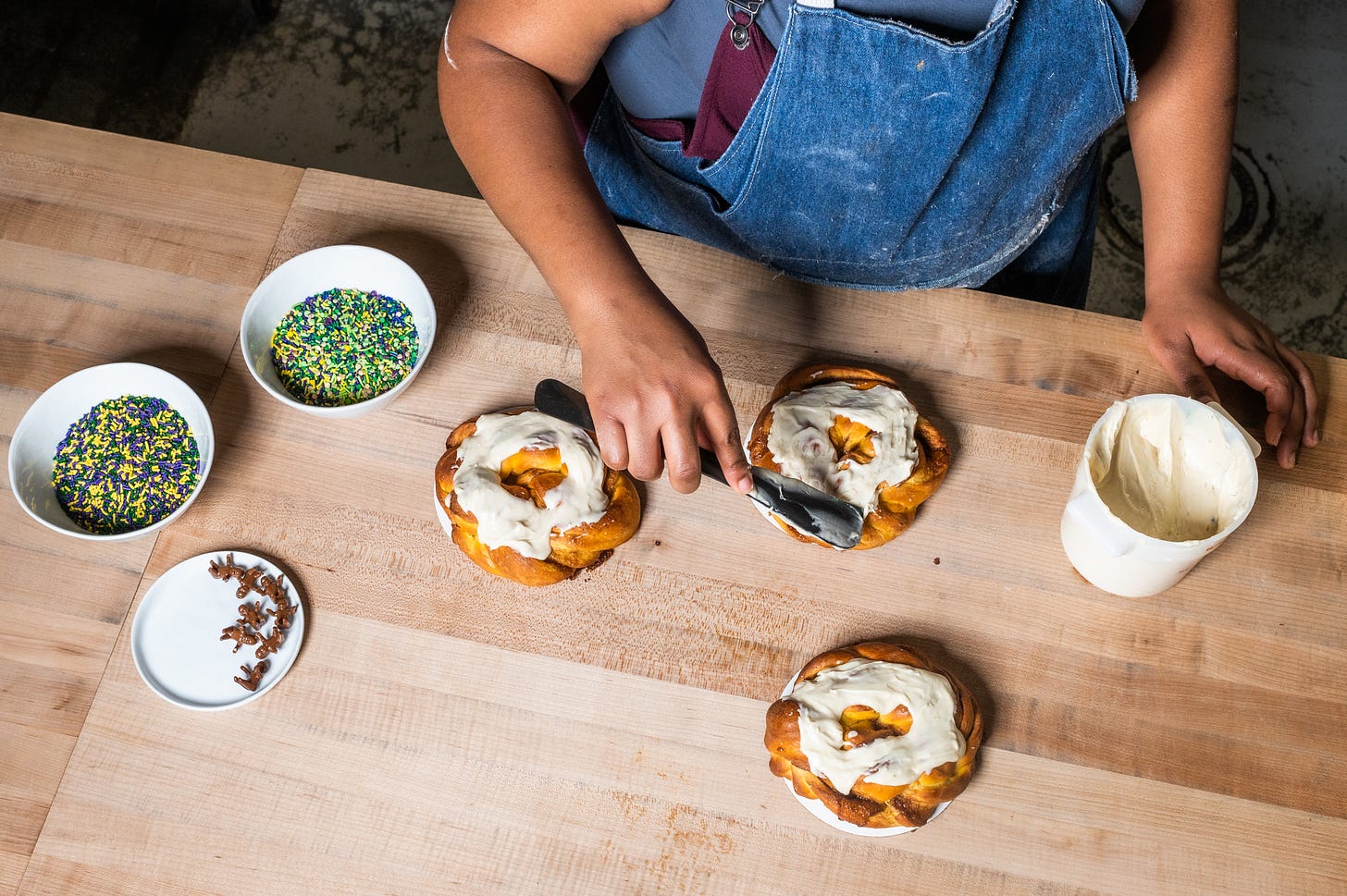Hey there friends,
Happy Mardi Gras! (Right? It’s…Mardi Gras?) We’re in the final week of Carnival, and any other year, the streetcar service along St. Charles would be suspended, the neutral ground and sidewalks would be lined with tarps, ladder chairs, and hundreds of pounds of plastic tchotchkes thrown from floats, and there’d be a lasting hum from marching bands and loudspeakers. This year, it’s eerily quiet. And clean? It’s weird. But also, necessary.
For the out-of-town readers, know that the spirit of this city can’t be confined to parades or seasonal tourist attractions. You don’t have to take my word on that: Let this map be your guide to the thousands of homes that have been decorated in lieu of parade floats this year. That Krewe of House Floats tour includes several grand works from local artists, thanks to a campaign from the Krewe of Red Beans.
So, celebrations look different this year. But we’ve still got a lot of color splashed around town, crawfish in the boil pot, and—the focus of our time together this week—king cake.

First: Ground Rules
King (and queen!) cakes can take many forms and flavors, but there are a few constants when it comes to our beloved pastry:
It’s seasonal and should only be consumed during Carnival, which begins with the feast of Epiphany (January 6) and ends on Fat Tuesday (this year, February 16).
While plastic baby Jesus is the most recognizable trinket found in a king cake, the original was a bean.
If the baby/fève is found hiding in your slice at a party (remember parties?), you’re responsible for bringing the king cake next time around. Or maybe you have to throw the next party? Not sure this one applies this year either way.
King Cakes & Conversation with Chef Carla Briggs
Yesterday, I spent the morning with Carla Briggs, who started Viola’s Heritage Breads with a partner almost a year ago. “Mardi Gras last year, we baked our first loaf. We brought it to a parade and all our friends tried it.” Carla committed then to bringing a better bread to market, exploring different grains like Einkorn as well as unbleached flours. “Who knew the week after, the stores would be out of bread?” That’s when they started selling to friends and family.
I’m visiting with Carla in Levee Baking Company’s space in the Irish Channel, where she’s filling orders for king cakes—57 large and 37 minis, in fact. She says the dough is similar to the sweet potato cinnamon rolls she recently shared on King Arthur’s blog, but the recipe is actually adapted from her sweet potato and rosemary loaf. The cakes are filled with a mixture of brown sugar and spices—cinnamon, nutmeg, ginger—and glazed with a citrus-infused icing.
Carla pulls a bright orange chunk from the dough. “I just want you to know, there are real sweet potatoes in there!”
King cakes aren’t traditionally sold until January 6, which is right before Carla’s birthday. “I remember growing up, going to a bakery—McKenzie’s—and grabbing a king cake to bring to school as my birthday cake.”
Carla first learned to cook from women in her family. She says her great-grandmother on her father’s side was the baker; her dad’s mom was too, but she died a few days before Carla was born. “Everyone says I get everything from her.” But it’s her maternal grandmother she credits for teaching her how to cook. “I just want her recipes saved and preserved—that’ll probably be my first cookbook. She didn’t write anything down, but she took all day, so I had time to watch her. She was the slowest cook. I loved her, I loved her food, but I was like, ‘Grandma, does it really take you two days? We want to eat!’”
Carla studied culinary arts at Johnson & Wales—first in Charleston, later transferring to Rhode Island. “I did not like bread when I was in school. Every class, I had some major life struggle.” She tells me that she missed the initial demos for one baking class because her grandmother died, and she couldn’t get help catching up from her classmates or from her teacher. “He proceeded to tell me that, because I’m Black and a woman, and from the South, maybe I shouldn’t bake. Because I’m not good at it, based on his interpretation at the time… But my grandmother died—the one who taught me how to cook. There was a lot going on. It wasn’t because of my ability or skill; life happened.”
Hardships continued to come. Carla was working as a teacher’s assistant her senior year when Katrina made landfall here in New Orleans. “I couldn’t get in contact with my family. [They] finally called but I had to answer the phone at work, which is not allowed, and I got in trouble for it. I left [to come home] a day before the semester ended and they yanked my entire scholarship. It was setback after setback.”
“I came back to help family, took a semester off, worked at Whole Foods and Emeril’s.” After an injury, Carla left the food industry and went into education. “And now I’m back at food. It doesn’t go away.” She laughs when she tells me this, using both hands to roll out smooth rounds of king cake dough. There’s an ease and resilience in her voice that’s difficult to describe.
Carla’s still working in education, teaching literacy to preschoolers through playing with food. I ask her what’s motivated her to push through her discouraging experiences in culinary school and to come back to baking. “I think it’s remembering what [my grandmother] taught me.”
A stronger motivation: “I know the sacrifice my family has made to get me here.” Carla later finished her semester but didn’t go back for graduation. “My family couldn’t afford to fly back to Rhode Island, so we just hung out here and had a good dinner at Emeril’s.”
As we’re talking, Carla pulls three of the mini cakes from a cooling rack to glaze. These are demos for “Good Morning America,” who reached out to feature her king cakes next Tuesday, Mardi Gras Day. She adds the sprinkles and presses a plastic baby into the icing so that she can send them a photo of how it’s supposed to be done. “It’s really not hard, and I feel like I shouldn’t be this picky, but…it’s my cake!”
We continue talking about business, about her vision for Viola’s future and how she defines success. I ask how customers can best support her efforts, and she says to encourage others (that’s y’all) to follow on Instagram and sign up for the newsletter on her website. And to be patient with small businesses, especially during the pandemic.
“Rethink how you buy bread or buy from small businesses—buy consistent, and make the commitment to stay with us. Things are always changing, but we can’t ever become more consistent unless we have consistent customers. We don’t have capital; you buy it, we sell it, we stay in business.”
As of publication, Carla’s king cakes are still available for purchase for local pickup or with 2nd-day shipping outside of the New Orleans area. On March 1, her company will launch subscription boxes filled with a sweet potato rosemary loaf and a Louisiana seafood boil bread—“like an onion loaf, but with the Trinity.”
Lagniappe
After raising over $2,000,000 for mutual aid efforts, Krewe of Red Beans has launched a new initiative to help save local bars affected by the pandemic: NOLA Bean Coin.
Yelp has published an interactive map with more than 450 “Black Owned Businesses & Restaurants That Shape + Build Our Beautiful City.”
Southern Solidarity just launched a crowdfunding campaign to raise funds for equipment for Liberation on Agriculture (LOA) Herbs and Garden.
Minimart, a locally developed online platform for food businesses, got a recent write-up in Thrillist.
Last but not least, Ian McNulty has 16 more king cake recommendations (for after you’ve ordered from Carla, of course).

Thanks for subscribing, y’all! Thanks to Carla for making time in the final push of the season, and thanks to my partner Rémy for the editing assist.
I’ll see you again in two weeks, from the home kitchen of Chef Jason Goodenough, where he shares his recipe for Creole cream cheese cavatelli!













